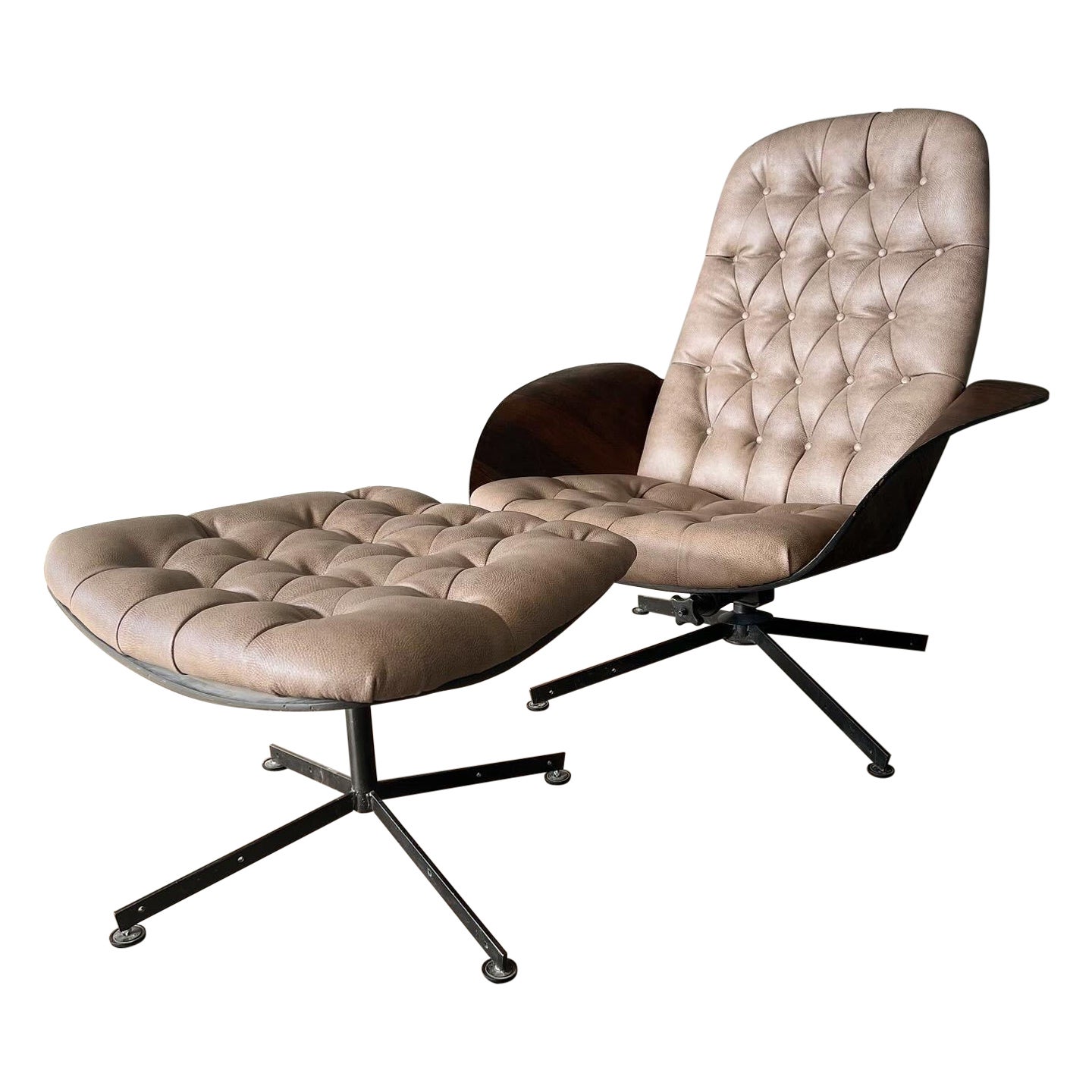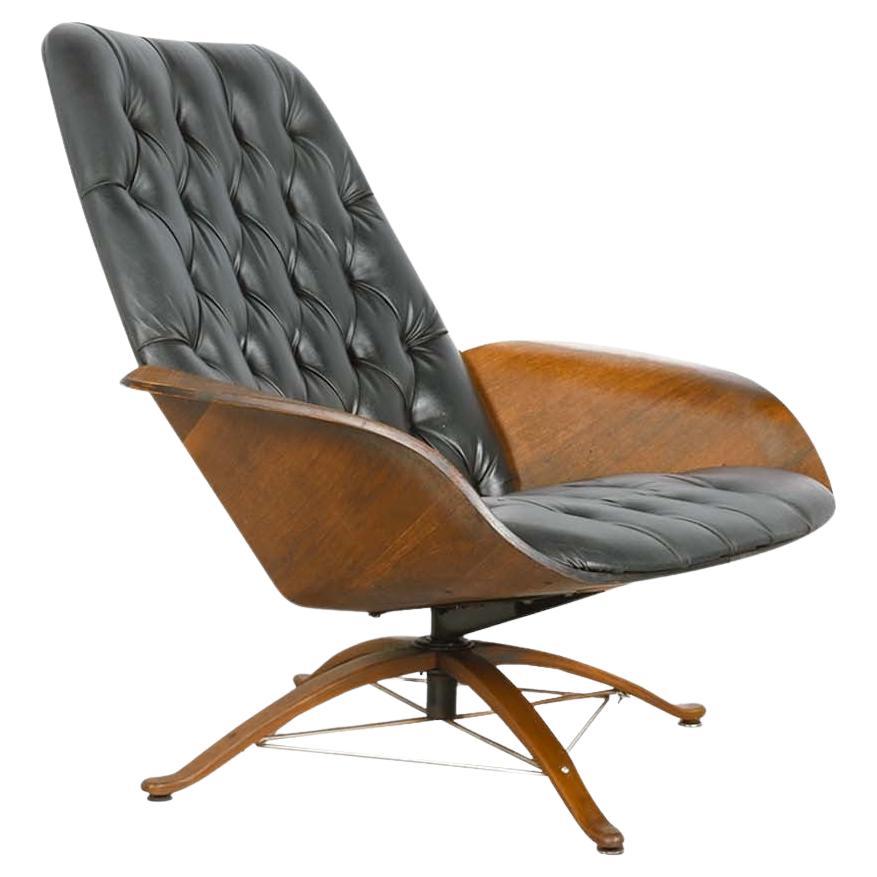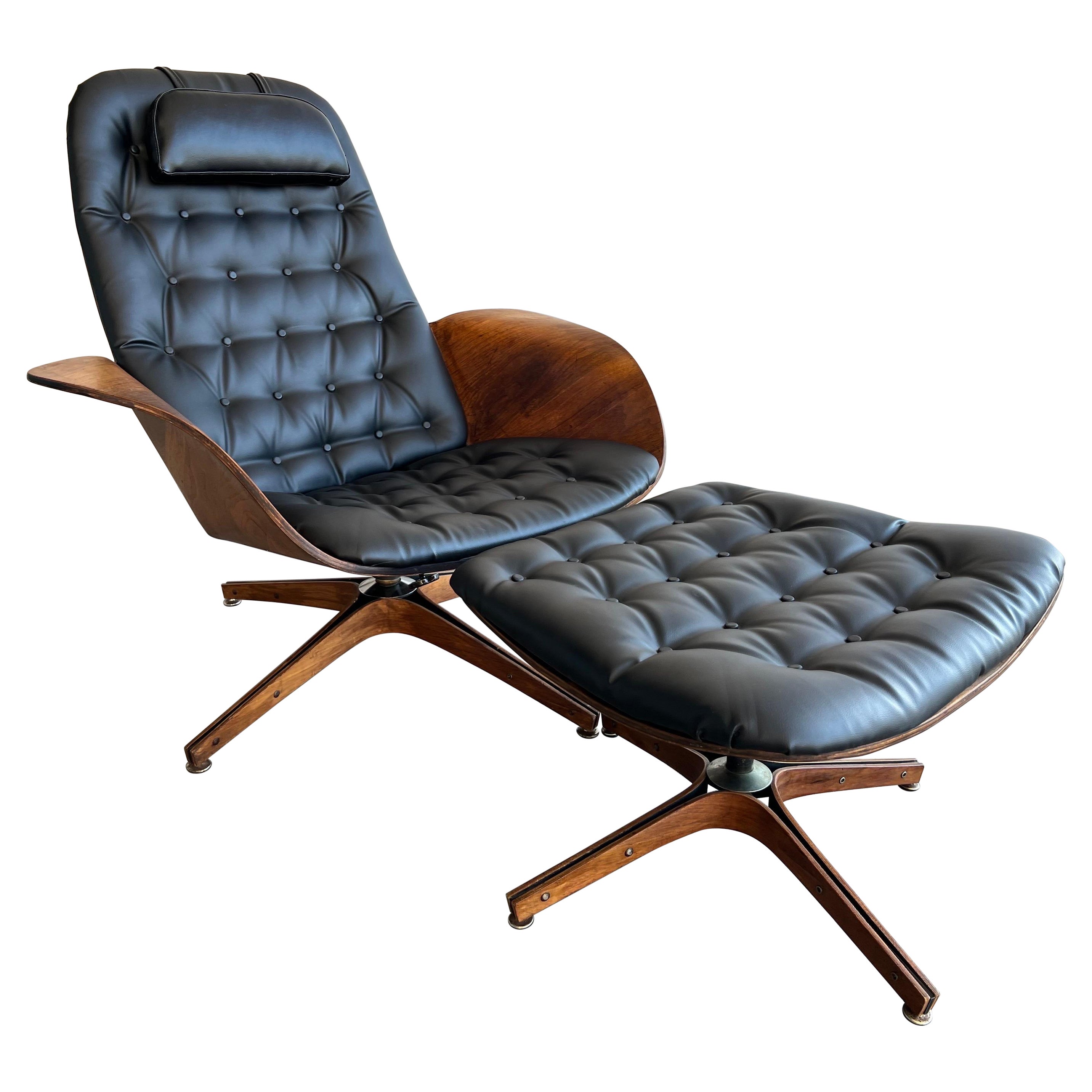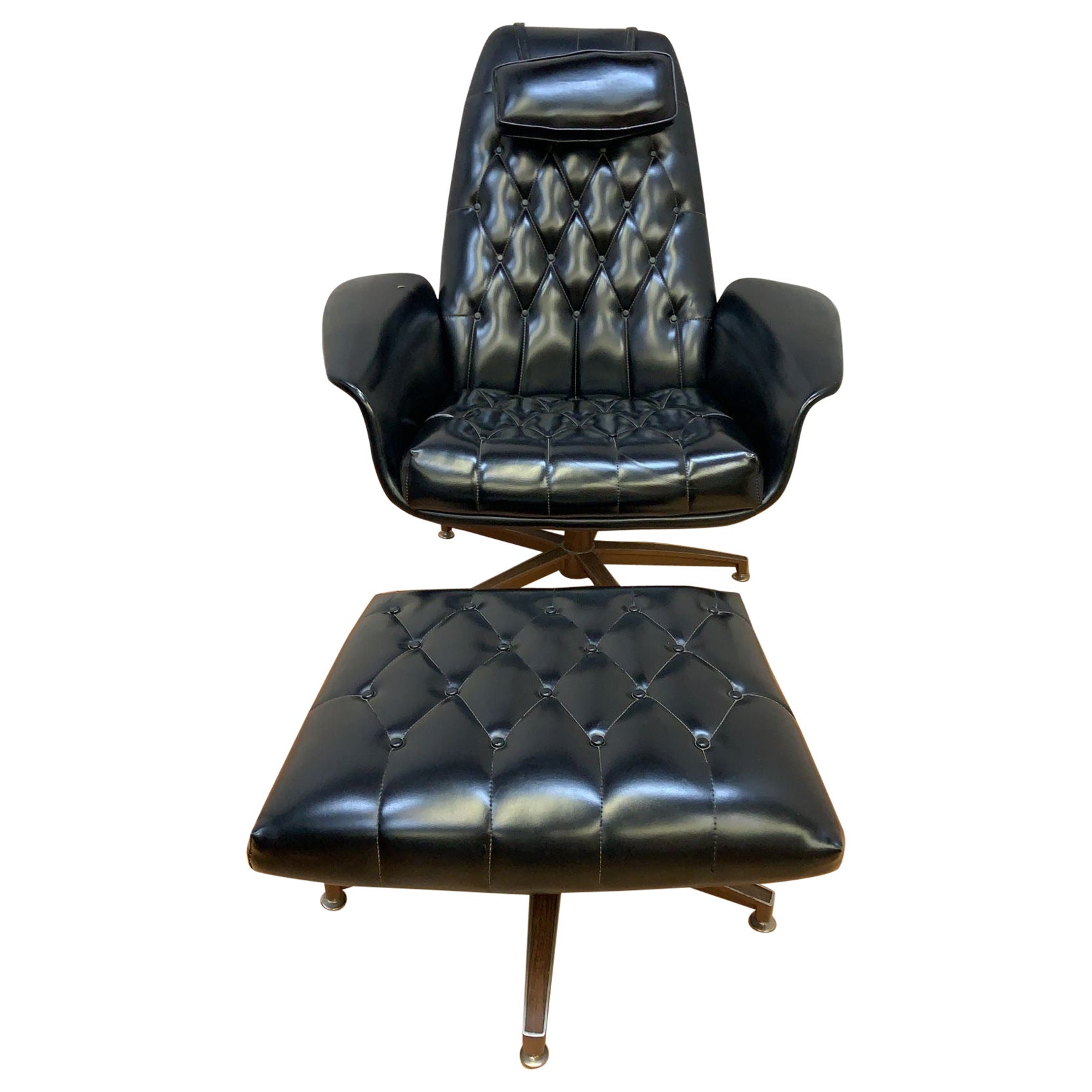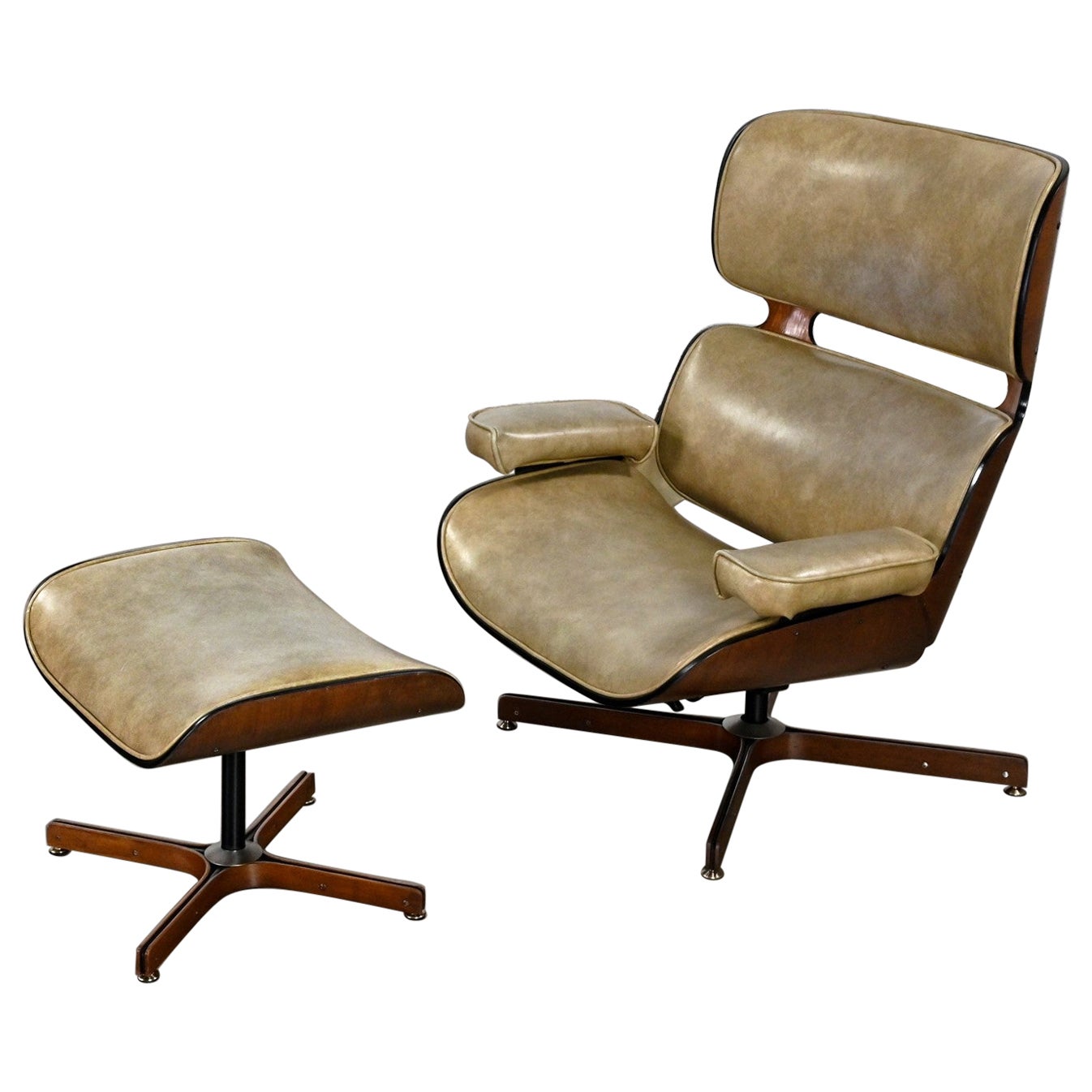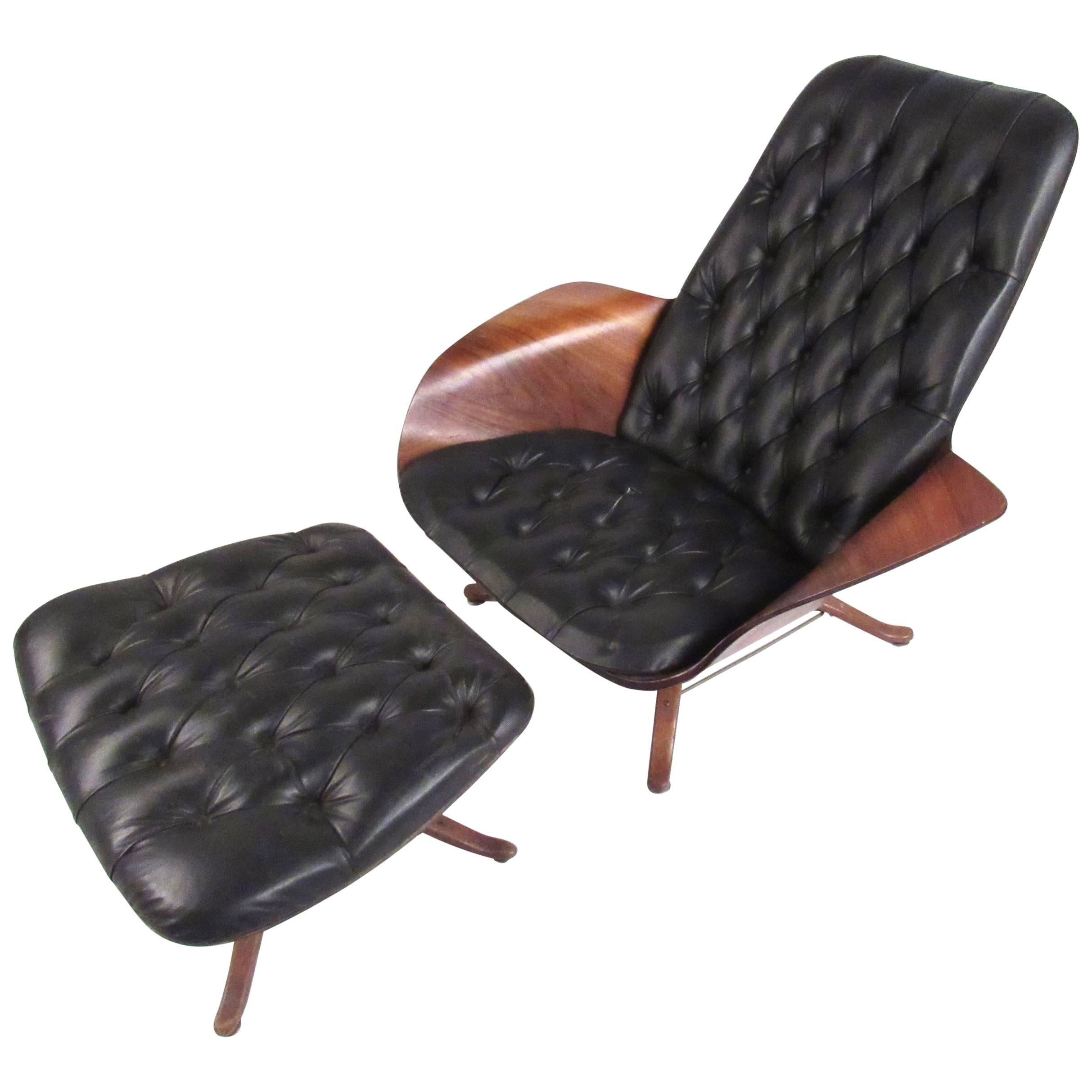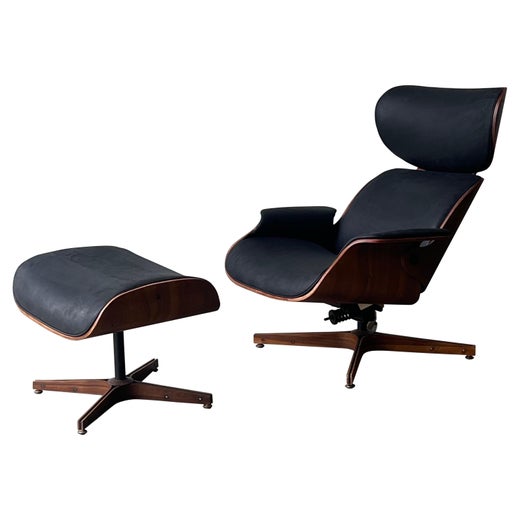George Mulhauser for Plycraft Mr. Chair Wingback Lounge Chair and Ottoman, 1960s
About the Item
- Creator:George Mulhauser (Designer),Plycraft (Manufacturer)
- Dimensions:Height: 41.5 in (105.41 cm)Width: 32 in (81.28 cm)Depth: 32 in (81.28 cm)Seat Height: 15 in (38.1 cm)
- Style:Mid-Century Modern (Of the Period)
- Materials and Techniques:
- Place of Origin:
- Period:
- Date of Manufacture:1960s
- Condition:Refinished. Wear consistent with age and use. Minor losses.
- Seller Location:Deland, FL
- Reference Number:
George Mulhauser
Reflecting on George Mulhauser’s decades-long career conjures up images of him sitting in his well-known Mr. Chair — a luxurious reclining mid-century modern lounge chair for Plycraft made from a single sheet of plywood — and thinking to himself what mark he would leave on the world of furniture design.
Mulhauser studied industrial design at Pratt Institute in Brooklyn, New York, and graduated in 1953. His early designs were quite venturesome and landed him his first design job in the Manhattan studio of architect, journalist and designer George Nelson, who was the director of design for legendary Michigan furniture manufacturer Herman Miller.
In 1955, Mulhauser designed his now-immediately recognizable Coconut chair. Angular and visually striking, this alluring lounge chair, with its sloping molded plastic shell, was something of a prelude. Soon, Mulhauser would make the acquaintance of American furniture designer Paul McCobb. Mulhauser collaborated with McCobb on concepts for molded fiberglass chairs, and McCobb’s Origami chair for Directional would become a big hit on the mid-20th century market.
Mulhauser kept busy. In his home studio, he sketched out each furniture design on paper and then translated them to handmade scale models. Mulhauser engaged his neighbors and family in trying out his sophisticated seating and gathered feedback for improvements. He designed his Mr. Chair for Plycraft — an adjustable armchair with a seat of tufted leather that yielded a series — and collaborated with many other companies throughout his career, including Directional, Singer, Overman and the Design Institute of America. He also taught furniture design at Pratt Institute, while the Newark School of Fine and Industrial Arts brought him on as an instructor of 3-D design.
On 1stDibs, find a collection of vintage George Mulhauser chairs, lounge chairs and other furniture.
Plycraft
While the history of Plycraft is marred by scandal and lawsuits, the American furniture manufacturer produced charming lounge chairs and other seating during the mid-century modern era that are sought after by collectors today.
Paul Goldman founded Plycraft in Lawrence, Massachusetts, in 1953 — he had secured military contracts for the manufacturing of bentwood products during World War II and was able to move into the commercial market thereafter. While Plycraft counted fiberglass boats among its early offerings, its primary focus switched to furniture when what we now call mid-century modernism hit its stride and more designers began to explore the possibilities of bentwood furniture thanks to the revolutionary work of Alvar Aalto and Michael Thonet. Goldman was Plycraft’s principal designer, but George Mulhauser and Norman Cherner were also enlisted to create furniture for the brand.
In 1952, a designer named John F. Pile, who was working in the studio of Herman Miller design director George Nelson, conceived what he called the Pretzel chair in walnut and birch. Pile’s seat, which was inspired by European modernist design, proved too costly to manufacture and it had structural problems. So the illustrious Michigan furniture maker subcontracted Plycraft to produce the Pretzel chair — an agreement that was short-lived owing to a dispute between Plycraft and Herman Miller.
Goldman subsequently tapped Norman Cherner — an innovative architect, designer and professor at Columbia University who was recommended by Nelson — to create an iteration of the Pretzel chair that would be stronger and cost-efficient to manufacture.
Cherner submitted a comfortable, curvaceous update to the Pretzel chair in molded plywood but was told by Plycraft that the project was being scrapped and his drawings shelved. Months later, Cherner was shocked to stumble upon his redesigned chair in a furniture showroom in New York under the Plycraft name. Cherner sued Plycraft and won — the Cherner chair later appeared in a Norman Rockwell painting on the cover of The Saturday Evening Post.
In the late 1950s, designer George Mulhauser created the Mr. Chair for Plycraft, an adjustable, tilting, swivel armchair with a matching ottoman. Mulhauser was also a designer in George Nelson’s studio and is credited with having conceived the iconic Coconut lounge chair for Herman Miller. With its tufted leather seat and shell crafted from a single sheet of plywood, the Mr. Chair lounge — part of a line of seating for which Mulhauser was commissioned — bears a resemblance to the now-legendary Eames lounge chair, which was designed by Ray and Charles Eames for Herman Miller. Mulhauser’s chair was very successful for Plycraft. A model was even spotted on an episode of Star Trek.
- ShippingRetrieving quote...Ships From: Deland, FL
- Return PolicyA return for this item may be initiated within 14 days of delivery.
- Mrs. Lounge Chair in Walnut & Vinyl by George Mulhauser for Plycraft, c. 1960sBy George Mulhauser, PlycraftLocated in Deland, FLIntroducing a true Mid Century Modern masterpiece: the Low Back Lounge Chair designed by George Mulhauser. This iconic model, known as the "Mrs. Chair", is in 100% original, vintage condition making it ideal for collectors and designers alike searching for an authentic Plycraft bentwood chair. Constructed from a bentwood walnut shell with mesmerizing woodgrains, this chair is both durable and stylish and an iconic piece of American Mid-Century Modern design. George Mulhauser was an American industrial designer who gained fame in the 1950s and 1960s for his furniture designs. He was one of the most important designers of the Mid-Century Modern era, and his designs were frequently featured in the pages of the most prestigious design publications of the time. He was a major player in the furniture design industry and his designs were considered as modern for all...Category
Vintage 1960s American Mid-Century Modern Lounge Chairs
MaterialsWalnut
- Bentwood Lounge Chair and Ottoman by George Mulhauser for Plycraft, USA, 1960sBy George MulhauserLocated in Deland, FLAs comfortable as it iconic this lounge chair and ottoman set, designed by the acclaimed George Mulhauser, is the epitome of functional art. Constructed of walnut plywood audaciously...Category
Vintage 1960s American Mid-Century Modern Chairs
MaterialsWalnut
- Tufted Mr. Chair with Star Base by George Mulhauser for Plycraft in Walnut 1960sBy George MulhauserLocated in Deland, FLEqual parts comfort and style this iconic Mr. Chair, designed by the acclaimed George Mulhauser, is the epitome of functional art. The shell, constructed of audaciously-shaped bent w...Category
Vintage 1960s American Mid-Century Modern Chairs
MaterialsWalnut
- Leather Sling Lounge Chair & Ottoman Set by Angel Pazmino, Ecuador, c. 1960sBy Angel PazminoLocated in Deland, FLIntroducing a rare sling chair and ottoman set by the incomparable Angel Pazmino. Recently and painstakingly restored by our team of craftsmen this iconic set has a new lease on life...Category
Vintage 1960s Ecuadorean Mid-Century Modern Lounge Chairs
MaterialsLeather, Jacaranda
- Architectural Wave Chaise Lounge Chair by Lawrence Peabody for Selig, c. 1960sBy Lawrence Peabody, SeligLocated in Deland, FLA contoured build sure to be the statement piece in your living space. Found in the original upholstery and set on maple tapered legs. Buy in it's original state or if the fabric isn...Category
Vintage 1960s American Mid-Century Modern Lounge Chairs
MaterialsFabric
- Model 68 Lounge Chair & Ottoman in Leather by Georg Thams for A.S. Vejen, 1960'sBy Georg ThamsLocated in Deland, FLIntroducing a rare, authentic Danish Modern 'Fåtölj' Model 68 lounge chair and ottoman set designed by the influential Georg Thams for A. S. Vejen Polstermøbelfabrik. Designed and cr...Category
Vintage 1960s Danish Mid-Century Modern Lounge Chairs
MaterialsAluminum
- 1960s vintage Mr. Chair and ottoman by George Mulhauser for PlycraftBy George Mulhauser, PlycraftLocated in Phoenix, AZ1960s vintage Mr. Chair and ottoman by George Mulhauser for Plycraft. This iconic mid century modern chair features sculptural bent walnut armrests and new textured leather tufted up...Category
Vintage 1960s American Mid-Century Modern Lounge Chairs
MaterialsLeather, Walnut
- Mid Century 1960s Plycraft Mr. Chair Lounge Chair George MulhauserBy Plycraft, George MulhauserLocated in Baltimore, MDFinely crafted vintage mid century, Plycraft's "Mr. Chair" lounge chair beautifully designed by George Mulhauser, for Plycraft, 1960's, swivel lounge chair. Features a stunning profi...Category
Vintage 1960s American Mid-Century Modern Lounge Chairs
MaterialsNaugahyde, Walnut
- Mid Century Modern 1960s Plycraft George Mulhauser “Mr. Chair” and OttomanBy George Mulhauser, PlycraftLocated in Phoenix, AZ1960s vintage Mr. Chair and ottoman by George Mulhauser for Plycraft. This iconic mid century modern chair features sculptural bent walnut armrests and brand new black vinyl tufted u...Category
Vintage 1960s American Mid-Century Modern Lounge Chairs
MaterialsFaux Leather, Walnut
- George Mulhauser Leatherette Mr. Chair Lounge & Ottoman for Plycraft - Set of 2By George Mulhauser, PlycraftLocated in Chicago, ILMid Century Modern George Mulhauser Mr. Chair Lounge & Ottoman for Plycraft in Black Leatherette This is a an amazing timeless chair and ottoman by designer George Mulhauser for Ply...Category
Vintage 1950s American Mid-Century Modern Lounge Chairs
MaterialsFaux Leather, Teak, Walnut
- Mid 20th MCM Mr. Chair Lounge Chair & Ottoman by George Mulhauser for PlycraftBy George Mulhauser, PlycraftLocated in Topeka, KSFabulous Mid Century Modern “The Mr. Chair” lounge chair & ottoman by George Mulhauser for Plycraft comprised of walnut bentwood frames or shells, tan vinyl or faux leather, black pa...Category
Mid-20th Century American Mid-Century Modern Lounge Chairs
MaterialsMetal
- Mid-Century Vintage "Mr. Chair" and Ottoman by George Mulhauser for PlycraftBy Plycraft, George MulhauserLocated in Brooklyn, NYThis molded ply lounge chair by George Mulhauser features stylish wing-like arms, tufted vinyl, and a unique hardwood base with brass eiffel stretchers. The combination of mid-centur...Category
Vintage 1960s American Mid-Century Modern Lounge Chairs
MaterialsFaux Leather, Wood, Bentwood, Plywood
